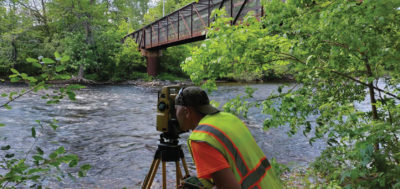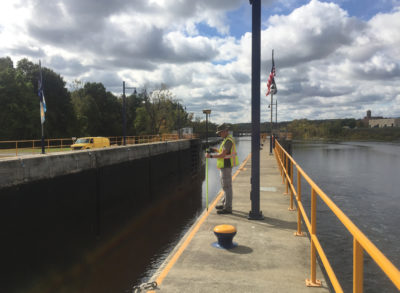
Prior to going on the river, Patriot D&C’s Jeff Wren, a USMC veteran, uses a Topcon GPT-3003 to take shots of the channel bank from a lock on the Hudson.
Although Dan MacDonald, P.L.S., is passionate about a lot of things—his family, the outdoors, surveying, and good food immediately come to mind—he is particularly committed to the plight of today’s service veterans and their ability to re-enter the workforce upon separation. Through his co-owned company, Patriot Design & Consulting, a certified Service-Disabled Veteran-Owned Small Business, he is actively seeking to bolster his workforce, and others, with veterans (both skilled and those willing to learn). He also played an integral part in the passage of New York State’s Service Disabled Veteran-Owned Business Act which became law in 2014. For him, leveling the field is more than just a survey function—it’s the right thing to do for those who sacrificed for this country.
Advocate for Change
Founded in 2013 as MacDonald Land Surveying & Engineering, a full service surveying company, owner Dan MacDonald drew upon the skills he had acquired in the military.
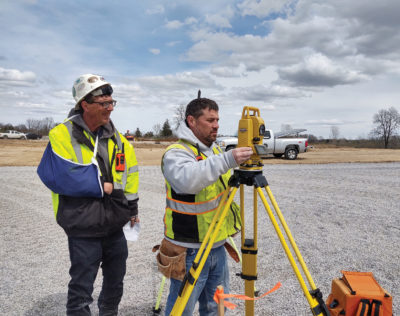
Tom Daly and Patriot co-owner Dan MacDonald do construction layout for the new Western New York National Cemetery in Pembroke, N.Y. When complete, the cemetery will provide the final resting place for 96,000 veterans and their spouses.
“A forward observer directs artillery, and that action is essentially a survey function,” he said. “Then, in my second enlistment, I was in intelligence as a mapping specialist. Both of those jobs were interesting, so when I got out, I went to college for civil engineering. Although I got a job doing that, I am an outdoors person at heart and didn’t like being in an office all day. Confident that I could handle a survey instrument, I landed a job with a company doing pipeline surveying. Shortly after that, I got my degree in surveying from Alfred
State College and felt like I was finally where I needed to be in my career.”
Soon, where he needed to be ran headlong into what he needed to do. Though the economy was in decent shape and jobs were available, few employers were aware of the challenges facing returning veterans like himself.
“When I got out, I quickly realized that there are certain things civilian employers didn’t quite get,” he said. “For example, if a vet has a 10:00 a.m. appointment at a VA hospital, and is asked by his employer to change that appointment, he or she might have to wait six months to get another chance to see a doctor. It’s not as easy for us as it is on the civilian side, and the average employer doesn’t realize that. Situations like that prompted me to want to advocate for vets going though those kind of issues.”
Kindred Spirits
In the course of building his business, MacDonald had regular interaction on projects with Rex Tolman, owner of Tolman Engineering, a Jamestown, N.Y.-based firm that offered expertise in civil, mechanical, environmental and municipal engineering. There was not only a great deal of professional synergy between the two companies, both firms were headed up by disabled veterans and active in the area of promoting the cause of veterans in the workforce.
“Rex had been in business since 2002, and, in addition to doing projects together, we had both been working hard to gain passage of the New York State Service Disabled Veteran-Owned Business Act. In 2014, he got a call from a major general contractor asking if he could provide survey services for a project. We did the job together and the contractor loved our work—on time, under budget, no problems. From that point forward, we just felt it would be mutually-beneficial to combine our disciplines under one company name. So we did, and in May of 2017, Patriot Design & Consulting was born.”
Today, that company employs more than 20 full-time people—a number that swells by nearly 30% in summer when construction inspectors are added. And, according to MacDonald, the workload is such that they could easily support a larger staff—if people were available.
“Everyone in construction today is struggling to find people to fill positions,” he said. “Add in the fact that a survey/engineering function is a bit more specialized and that we are actively seeking to fill those slots with disabled vets and the challenge becomes even greater. But we try to do what we can and have landed some really great, very talented people along the way.”
No Requirement Needed
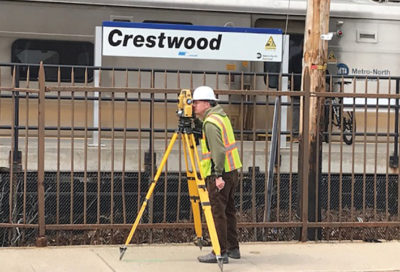
As part of the overall design/build process, topos were gathered at the Metro-North’s Crestwood Station—one of five stations done by Patriot—which is also undergoing major renovations.
While being a Service-Disabled Veteran-Owned Business (SDVOB) does afford Patriot a small advantage when competing for work—the passage of the bill they championed helps ensure that—they’ve secured most of their work based on performance rather than quota.
“Truth be told, there are not a lot of SDVOB firms in the survey/engineering world,” he said. “So we are kept very busy because of our status. On the other side of that coin, however, we regularly get asked to come out on jobs with no such requirement. I have to believe that’s the result of the emphasis we put on high quality service to our customers.”
A good percentage of Patriot D&C’s survey work—roughly 25%—revolves around FEMA-related projects, including flood-plain surveys and bridge assessment, work that, without the proper instrumentation, can be labor-intensive. A long-time proponent of use robotic total stations, MacDonald, with Topcon equipment acquired through the Rochester branch of Admar Positioning Solutions, has used them to streamline that laborious process.
“Depending on what you are doing, a robot can make you a one-person operation versus two,” he said. “And, in many cases, I find the robot to be faster than doing a job with two men. If we are doing a topo survey in a wide-opened field, for example, the robot is tracking me, I stop, plumb up and get the shot. There is no coordination between two people needed—and, more importantly, no mis-communication between me and the second person. It’s fast, it’s accurate and it’s reliable.”
Those Dam Bridges
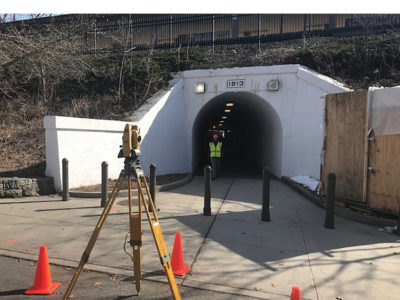
Patriot’s team conducted topos at the White Plains station in advance of a major improvement project for the MTA’s Metro-North Commuter Railroad. The Metro-North provides rail service between New York City, its northern suburbs and parts of southern Connecticut.
While most of Patriot’s traditional flood-plain work centers around a topo survey, they have kept their robots equally busy with other work conducted on behalf of FEMA as well. Surveying a series of bridges—in both New York and Virginia—to assess susceptibility to logjams during periods of flooding, MacDonald has found the solution invaluable.
“In that type of work, we shoot points at specific places on the bridge, on the banks of the stream or river, and in the water itself” he said. “That info can help FEMA engineers later determine at what point the bridge, which tends to trap trees and other debris during periods of heavy rain, essentially becomes a dam.”
Using a two-man crew with a robot, Patriot’s crew chief will start with a sketch and some specific photos of the site. At the same time he’s doing that, however, the instrument man is taking all his basic shots with the robot. At that point, the activity switches to the river or stream where MacDonald has a small boat configured to provide a geospatially accurate representation of the river bottom.
“For that part of the job we use a Topcon HiPer V GPS receiver working in tandem with a sounding device,” said MacDonald. “The sounder shoots a depth at one-second intervals, while the receiver places that point in space. The goal is for hydrologists to determine how much water that channel can contain before it overspills—we give them the data to do that. The process is so efficient that, while most companies doing similar work get two bridges done per day, we can do four or five,” said MacDonald. That’s a nice advantage to have.”
Growing Pains
The success Patriot D&C is enjoying comes at a price. A visit to their Rochester offices finds a firm literally busting at the seams. Every available inch of usable office space has already been spoken for, prompting a need to move to a new location.
“We have an eye on a nice property, an old farmhouse that is double the size of our current location, that will allow us to breathe—and grow,” he said. “We’ve been blessed with the success we’ve had and a lot of the credit for that goes to the technology and the people we employ.”
To that first point, in addition to the robots, MacDonald said that they currently use a pair of Topcon HiPer V base stations—to which they will soon be adding a HiPer VR receiver—and two FC-5000 data collectors running MAGNET Field software.
“MAGNET allows us to immediately get work from the field back to the office, which is an excellent time-saving feature,” he said. “I have had occasions where I was headed to a site and someone would ask me to shoot something that they missed. I simply shoot it, send it back and they can move forward with their work. And, because the data is automatically collected and recorded, it minimizes manual record keeping which is great for my guys.”
MacDonald said that he has been a loyal customer of Admar Positioning since the inception of Patriot D&C, a commitment that centers on the quality of service they provide.
“Evan Spencer and Frank Dutko at Admar are fantastic to us,” he said. “If we have an issue, I call Evan and he will either talk me through it or immediately come out to help us. The same holds true for Frank if it’s a repair issue—after all, some of our equipment does have some mileage on it. Would we like everything to be new? For sure, but we are young enough where money is still an issue. However, there’s no denying the payback on the GNSS gear, and Admar’s support helps make that happen.”
Mutually Beneficial
The second part of that technology/people equation is a bit more challenging. While it is admittedly impossible to maintain an entirely-veteran workforce, MacDonald works hard to find talented vets who want to join the Patriot team. Several of his current crew are the result of him working with the local Veterans Outreach Center. He also said regularly contacting the VA representatives at area colleges has paid nice dividends—to date they’ve had workers from every branch of the service except the U.S. Coast Guard.
“One in particular, a Marine Corps vet who graduated from Erie Community College, has been inspecting for us in summer and will now be going to RIT. Our hope is that he will come over to the survey side. It’s a challenging process for us but ultimately it’s a rewarding one. I’ve had wives call me up to thank us for the opportunities we’re offering and the impact it’s had on their lives. That means a lot and it keeps us going. But both Rex and I feel strongly about making people’s transitions back into civilian life more rewarding. That we are able to do so and build a business that benefits us all, is just icing on the cake.”
Another bit of icing on that cake? Both Tolman and MacDonald were invited by New York Governor Andrew Cuomo to witness the signing into law of the New York State Service-Disabled Veteran-Owned Business Act.
